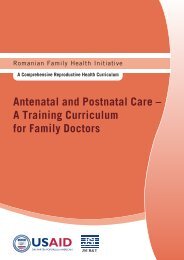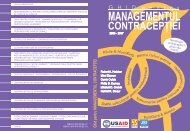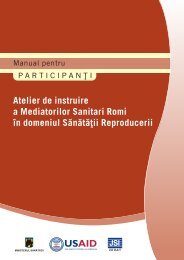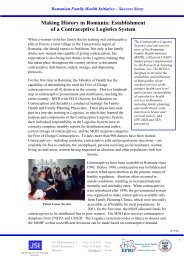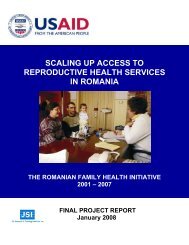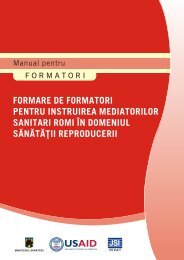- Page 1 and 2:
Romanian Family Health Initiative A
- Page 3 and 4:
2005 - JSI Research & Training Inst
- Page 5 and 6:
INTRODUCTION JSI Research and Train
- Page 7 and 8:
Acknowledgements This manual was de
- Page 9 and 10:
SESSION 1: INTRODUCTION OBJECTIVES:
- Page 11 and 12:
Common group norms: • Respect the
- Page 13 and 14:
Flip chart/ Participant document TR
- Page 15 and 16:
Participant document HEALTH MEDIATO
- Page 17 and 18:
Matching questions Below are two li
- Page 19 and 20:
Multiple Choice Questions Each of t
- Page 21 and 22:
SESSION 2: BASIC CONCEPTS OF REPROD
- Page 23 and 24:
Possible Answers: • Not to have c
- Page 25 and 26:
‣ How many children do you have?
- Page 27 and 28:
an important effect on reducing mat
- Page 29 and 30:
Trainer document FAMILY PLANNING De
- Page 31 and 32:
Trainer document THE RIGHTS OF THE
- Page 33 and 34:
Trainer document RELATIONSHIP BETWE
- Page 35 and 36:
(HOLD THE THIRD/SMALLEST SIGN IN FR
- Page 37 and 38:
SESSION 3: ANATOMY AND PHYSIOLOGY O
- Page 39 and 40:
• What is menstruation? • What
- Page 41 and 42:
Trainer document MALE REPRODUCTIVE
- Page 43 and 44:
lining like a pillow. If the girl/w
- Page 45 and 46:
Participant document 36 RFHI/JSI Ro
- Page 47 and 48:
Participant document 38 RFHI/JSI Ro
- Page 49 and 50:
Participant document MALE AND FEMAL
- Page 51 and 52:
‣ What do the terms “conception
- Page 53 and 54:
‣ What are the situations in whic
- Page 55 and 56:
During the exercise move around the
- Page 57 and 58:
Distribute the participant document
- Page 59 and 60:
Emphasize that although insertion o
- Page 61 and 62:
SUMMARY At the end of this session,
- Page 63 and 64:
Flipchart FAMILY PLANNING METHODS N
- Page 65 and 66:
FERTILITY AWARENESS METHODS Fertili
- Page 67 and 68:
Trainer document STEPS FOR CONDOM U
- Page 69 and 70:
Correct Use of Condom • Check the
- Page 71 and 72:
9. Explain the importance of withdr
- Page 73 and 74:
Trainer document COMBINED ORAL CONT
- Page 75 and 76:
Trainer document PROGESTAGEN-ONLY P
- Page 77 and 78:
Trainer document INTRA-UTERINE DEVI
- Page 79 and 80:
Trainer document VOLUNTARY SURGICAL
- Page 81 and 82:
Myths and Facts about Vasectomy Myt
- Page 83 and 84:
Male Condom Show the client the con
- Page 85 and 86:
Progestagen-Only Pills (POPs) Show
- Page 87 and 88:
Intrauterine Device (IUD) Show the
- Page 89 and 90:
Emergency Contraception Pills (ECPs
- Page 91 and 92:
Using the trainer’s document Stan
- Page 93 and 94: • When do you expect your next pe
- Page 95 and 96: Participant document CASE STUDIES (
- Page 97 and 98: Trainer document CASE STUDIES (answ
- Page 99 and 100: Participant document The majority o
- Page 101 and 102: Participant document HOW TO USE “
- Page 103 and 104: 6. If she recently had a miscarriag
- Page 105 and 106: Participant document FREQUENT ASKED
- Page 107 and 108: Recommended question: - Are you and
- Page 109 and 110: SESSION 6: SAFE MOTHERHOOD - PREGNA
- Page 111 and 112: ‣ What are the first signs of pre
- Page 113 and 114: • Comfortable clothing and footwe
- Page 115 and 116: o Abdominal pain o Weakness, tiredn
- Page 117 and 118: Discuss with participants how they
- Page 119 and 120: Flipchart FACTS ABOUT WOMEN’S LIV
- Page 121 and 122: Trainer document NORMAL BODY CHANGE
- Page 123 and 124: Trainer document/Participant docume
- Page 125 and 126: Trainer document MYTHS AND FACTS RE
- Page 127 and 128: Work and domestic activities Pregna
- Page 129 and 130: Trainer document CASE STUDIES Elena
- Page 131 and 132: II-IV. POSTPARTUM VISITS (45 minute
- Page 133 and 134: Suggest that another important topi
- Page 135 and 136: Trainer document WOMEN’S NEEDS DU
- Page 137 and 138: Participant document COUNSELING ON
- Page 139 and 140: Explain why newborns need a lot of
- Page 141 and 142: • Beside routine weekly visits of
- Page 143: Trainer document ESSENTIAL NEWBORN
- Page 147 and 148: SESSION 9: BREASTFEEDING OBJECTIVES
- Page 149 and 150: • Every child should be exclusive
- Page 151 and 152: 1. Demonstrate how to help a mother
- Page 153 and 154: - for sick or disabled babies. 3. D
- Page 155 and 156: Some women have very large areolas,
- Page 157 and 158: • The baby suckles as often and f
- Page 159 and 160: Flip chart BENEFITS OF BREASTFEEDIN
- Page 161 and 162: Participant document PRINCIPLES OF
- Page 163 and 164: Overhead BABY’S ATTACHMENT TO THE
- Page 165 and 166: Participant document Sore or Cracke
- Page 167 and 168: Trainer document ANSWERS TO FREQUEN
- Page 169 and 170: Trainer document MYTHS ABOUT BREAST
- Page 171 and 172: SESSION 10: SEXUALLY TRANSMITTED IN
- Page 173 and 174: • The sexual act can be vaginal,
- Page 175 and 176: sick and spread to others. ‣ How
- Page 177 and 178: cells (which fight against infectio
- Page 179 and 180: Participant document WAYS TO SIGNIF
- Page 181 and 182: Trainer document HIV/AIDS: WHAT IS
- Page 183 and 184: Participant document HOW IS HIV/AID
- Page 185 and 186: o Sexually transmitted infections c
- Page 187 and 188: Trainer document CAUSES OF INFERTIL
- Page 189 and 190: SESSION 12: BREAST AND CERVICAL CAN
- Page 191 and 192: • For health problems like cancer
- Page 193 and 194: Participant document BREAST SELF-EX
- Page 195 and 196:
SESSION 13: BASIC CONCEPTS OF COMMU
- Page 197 and 198:
‣ What is the purpose of talking
- Page 199 and 200:
‣ How do you feel about asking wo
- Page 201 and 202:
• I was told to come • I learne
- Page 203 and 204:
Distribute the participant document
- Page 205 and 206:
Trainer document FACTORS INFLUENCIN
- Page 207 and 208:
• One's personal susceptibility t
- Page 209 and 210:
Participant document 7 stages BEHAV
- Page 211 and 212:
Participant document DECISION-MAKIN
- Page 213 and 214:
SESSION 14: INTERPERSONAL COMMUNICA
- Page 215 and 216:
o Note next to each of their respon
- Page 217 and 218:
IV-VII. ACTIVE LISTENING (20 minute
- Page 219 and 220:
‣ What did she communicate to the
- Page 221 and 222:
‣ Did you want to put conditions
- Page 223 and 224:
Open questions help women: • To a
- Page 225 and 226:
The person who was listening: • P
- Page 227 and 228:
Divide the group into 5 small group
- Page 229 and 230:
Refer the group to the flip chart F
- Page 231 and 232:
Ask participants to change roles wi
- Page 233 and 234:
Flip chart OBSTACLES TO COMMUNICATI
- Page 235 and 236:
"You're acting like a child." "You
- Page 237 and 238:
Participant document ACTIVE LISTENI
- Page 239 and 240:
Participant document EXAMPLES OF QU
- Page 241 and 242:
Flip chart / Participant document R
- Page 243 and 244:
SESSION 15: GROUP EDUCATION SESSION
- Page 245 and 246:
• How long people have held these
- Page 247 and 248:
o Involve simulations, role play an
- Page 249 and 250:
‣ How many people see: a young l
- Page 251 and 252:
o Introduce the subject o Invite th
- Page 253 and 254:
‣ What did the mediator do to put
- Page 255 and 256:
Participant document CONTINUUM IN T
- Page 257 and 258:
Flip chart CONTINUUM IN THE EFFECTI
- Page 259 and 260:
Common teaching/animation methods:
- Page 261 and 262:
Trainer document DESCRIPTION OF ANT
- Page 263 and 264:
255 RFHI/JSI Romania Training of RH
- Page 265 and 266:
Participant document FACILITATING G
- Page 267 and 268:
Participant document CHECKLIST FOR
- Page 269 and 270:
Possible questions for facilitating
- Page 271 and 272:
Note: It is important that all part
- Page 273 and 274:
SESSION 18: EVALUATION OF THE TRAIN
- Page 275 and 276:
Participant document HEALTH MEDIATO
- Page 277 and 278:
Matching questions Below are two li
- Page 279 and 280:
II. Other aspects of the training B



